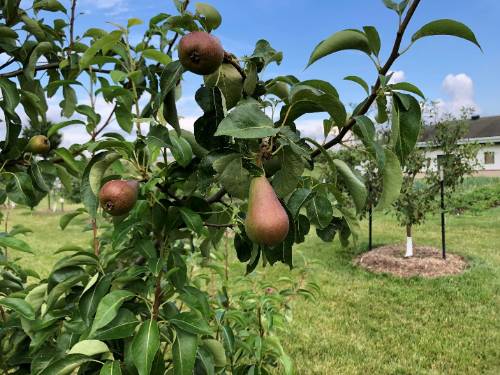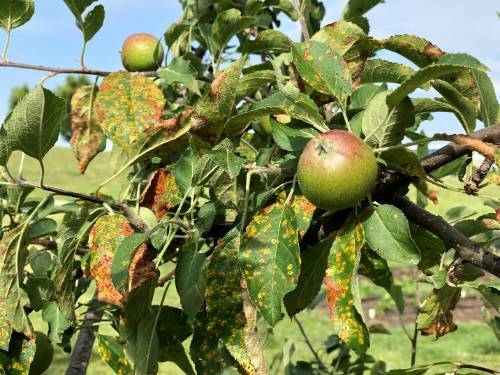Summer To-Dos in the Backyard Orchard
While it often seems that the majority of our tree fruit maintenance takes place in the spring, addressing certain tasks in the summer months can be essential to a successful harvest at season's end. Here are a few quick tips and recommendations for summer care of the backyard orchard.

Thinning – Overproduction of fruit puts a strain on the plant and can lead to decreased fruiting in the following years. If you have not thinned your tree fruit, it is important to do so now. Aim for one fruit per cluster and at least 4 fingers between each fruitlet.
Cleaning – Whether left behind from manual thinning or natural fruit drop, it is important to pick up fallen fruit around the base of trees and shrubs. Fallen fruit will harbor pathogens and insects overwinter. Removal of all residues (fallen leaves included) and weeds will decrease incidence and damage.
Scouting – Frequent monitoring of your fruit tree is key to improved orchard health and yields. Observe, the insects (eggs, larva, feeding adults) and their damage on leaves, fruit and wood. Contact the garden hotline, we will help you identify pests vs. beneficials and recommend management options. Watch for symptoms of disease (rot, spores, yellowing, etc...). Chemical controls and sprays are mostly preventive so keep notes this summer to guide the appropriate product and timing for next year.
Pruning – We typically avoid excessive summer pruning as it can weaken the tree going into fall and winter. However, pruning during the growing season can be an effective method to slow growth on trees that are already too large and vigorous. Likewise, summer pruning is recommended for the following:
- Removal of branches that are broken or diseased (summer is also a good time to cut out infected wood in cankers).
- Taking out suckers, water sprouts and any other branches that are growing vertical into tree middle—this will provide interior fruit with more light and air.
Irrigation – Despite the record rain falls experienced this spring, garden soils have dried out quickly and tree fruit are easily drought stressed. During the summer, root zones should be moist. Use the "finger test" stick your digit in the ground and only water when the soil is dry a few inches below the surface. Water deeply. Ground covers like a ring of woodchip mulch will help retain moisture.
As it may be easier to pick your fruit from the produce aisle than it is to maintain your own fruit tree. The satisfaction and quality you can produce in your own home orchard is worth the effort. So do not take the summer off, care for your tree and it will provide.

(Heavy rain and wind led to higher rate of cedar apple rust infection this year. Fungicides are not effective when symptoms are present; however, identifying susceptible trees during the summer can influence which planting you decide to treat next spring.)
Have questions?
The Garden Hotline is staffed by trained EMG volunteers and Extension staff who will assist you with questions. Phone: (913) 715-7050 Email: garden.help@jocogov.org